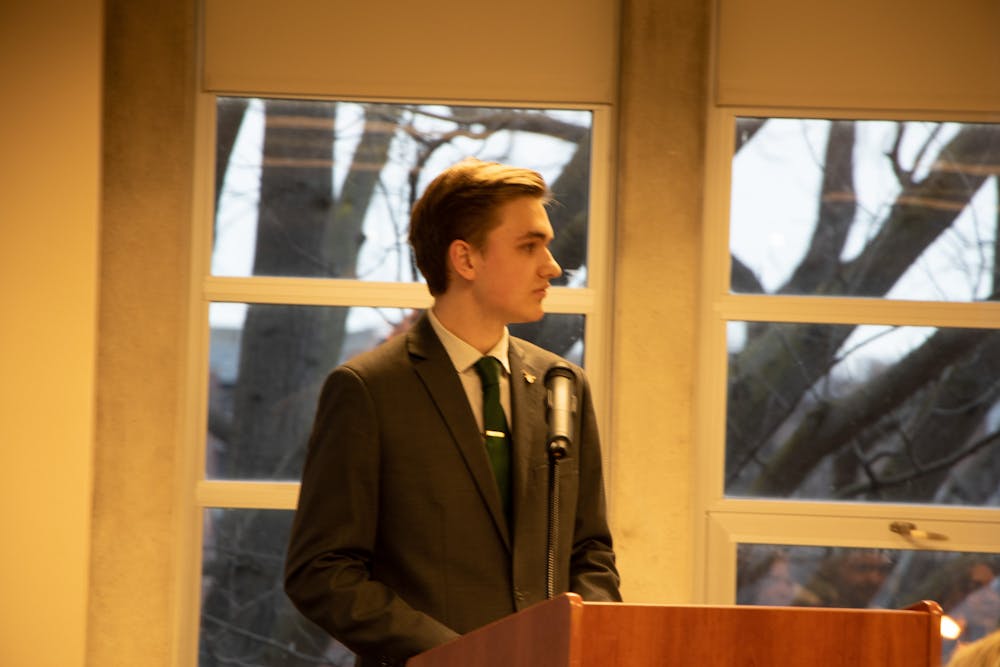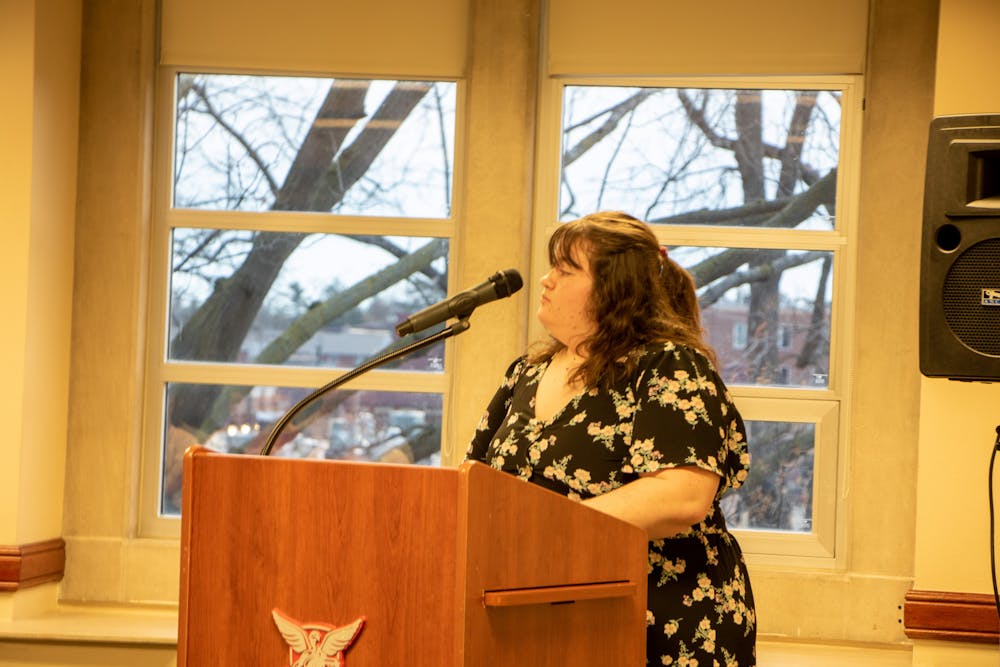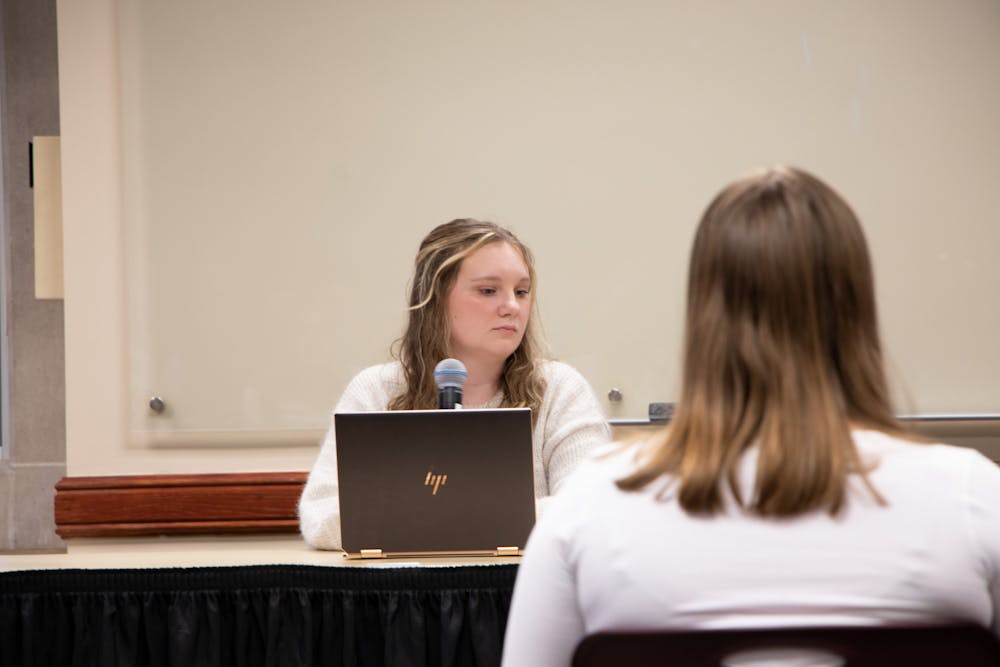Joseph Gassensmith, presidential nominee for the “Gassensmith & Lindstrand” ticket for Student Government Association (SGA) said he wants students to find “their home away from home.” Skylar Ellis, presidential nominee for “Empower,” said she wants students to feel heard.
Now each is running against each other for the role of president of SGA next year at Ball State University.
At the SGA presidential debate Feb. 14, Gassensmith and Ellis elaborated on their campaign points and were given time to rebuke the other candidate’s platform points.
RELATED: Ball State University Student Government Association tickets debate platform points
One point Ellis discussed was the implementation of a new bus loop called the purple loop. This is a major part of the transportation goal “Empower” lists on their Instagram page.
Ellis said the route will go around the back of the North parking garage, by Woodworth Complex and DeHority Complex and then go back down to the North campus area. Part of this goal is accessibility.
“There’s no current loop connecting these neighborhoods to the North neighborhoods,” she said. “Students right now have to walk to main campus to get access to those neighborhoods or to the North neighborhood through buses.”
Unlike Ellis, Gassensmith wants to establish a second blue loop. He said this will decrease bus waiting times. This is a goal mentioned on the “Gassensmith & Lindstrand” Instagram page.

Student Government Association Presidental Nominee Joseph Gassensmith listens to opposing Presidental Nominee Skylar Ellis discuss her platform points. Gassensmith is running on the "Gassensmith & Lindstrand" ticket and Ellis is running on the "Empower" ticket. Hannah Amos, DN
Gassensmith also said sustainability was important to his campaign and that his goal would be for Ball State University Dining Services to pursue 100 percent biodegradable containers.
Ellis said sustainability is a long-term goal that is difficult. Instead, she mentioned her goal of the purple loop again and mental health days, another one of her campaign goals.
“I would say students need accessibility now,” she said. “The students are here now and there’s not necessarily another option for them at the moment. Dining Services have already started taking steps towards sustainability, like with their biodegradable takeout containers … so we think a better route would be addressing the accessibility issues.”
One problem Gassensmith had with the mental health days “Empower” proposed was that he said there have been mental health days before on campus when he was a first-year and not all professors followed them. Instead, he wants to raise awareness for the Counseling Center and Health Promotion and Advocacy.
Another important point both candidates held was campus safety. Gassensmith plans to add more blue lights on campus where they are lacking, such as at the North Neighborhood, as well as at the apartments and along Riverside Avenue (Greek Row).
Candidates brought up the desire to implement more blue safety lights in previous tickets, such as RISE, but lack of funding was said to be the cause of why it didn’t happen.
RELATED: While Ball State University has blue light phones, how effective are they?
“Gassensmith & Lindstrand” hope to partner with the Big Four organizations– Black Student Association, Asian Student Union, Spectrum and Latinx Student Union– along with Fraternity and Sorority Life to help fund the blue lights.
According to Rave Mobile Safety these lights cost around $20,000 to install and $1,000 to maintain. During the debate, Ellis rebutted the goal of establishing more blue lights on campus, referring to the cost of them which she said was $28,000. The Daily News was unable to verify the exact cost with UPD prior to publishing.
Another campus safety point both tickets had was more sexual assault prevention programming. Ellis plans to require hall councils to have an event for sexual assault prevention awareness. This would have to do with their STARS goals, which are around eight to 10 goals associated with hall council, she said. Ellis wants one of the STAR goals to have to do with sexual assault prevention and education.

Student Government Association (SGA) Presdiential Nominee Skylar Ellis listens to opposing Presidental Nominee Joesph Gassensmith discuss his points Feb. 14 in the L.A. Pittenger Student Center. SGA elections will open online Feb. 20 at 8 a.m. and close Feb. 21 at 5 p.m. Hannah Amos, DN
“I think an important thing to know is that the hall councils are building-wide. Usually [resident assistants] they’re just their floor,” Ellis said. “They can team up with other RAs to do their programming, but hall council would be building-wide.”
She also said having hall councils do mandatory sexual assault prevention programs would help hall councils establish themselves as a resource for students.
“I will never know what it's like to be women, but I can add my voice to be more [with] allies and survivors in the fact that we will be planning to work with Health Promotion and Advocacy office to address sexual assault awareness,” Gassensmith said.
Gassensmith also plans to partner with the Residence Hall Association (RHA), a housing organization, to Red Zone awareness training within the residence halls.
“The red zone is the first six weeks of freshmen move-in when someone is most likely to be sexually assaulted,” Gassensmith said.
Gassensmith and Ellis have more information about each of their campaign goals on their Instagrams @gassensmith.lindstrand23 and @empower.23.24.
The vice presidential debate is Feb. 15 at 5:30 p.m. in the L.A Pittenger Student Center in room 301/302. Online voting polls open Feb. 20 at 8 a.m. and close Feb. 21 at 5 p.m., according to the SGA elections website.
Contact Hannah Amos with comments at hannah.amos@bsu.edu or on Twitter @Hannah_Amos_394. Contact Elissa Maudlin with comments at editor@bsudailynews.com or on Twitter @ejmaudlin.





The Daily News welcomes thoughtful discussion on all of our stories, but please keep comments civil and on-topic. Read our full guidelines here.